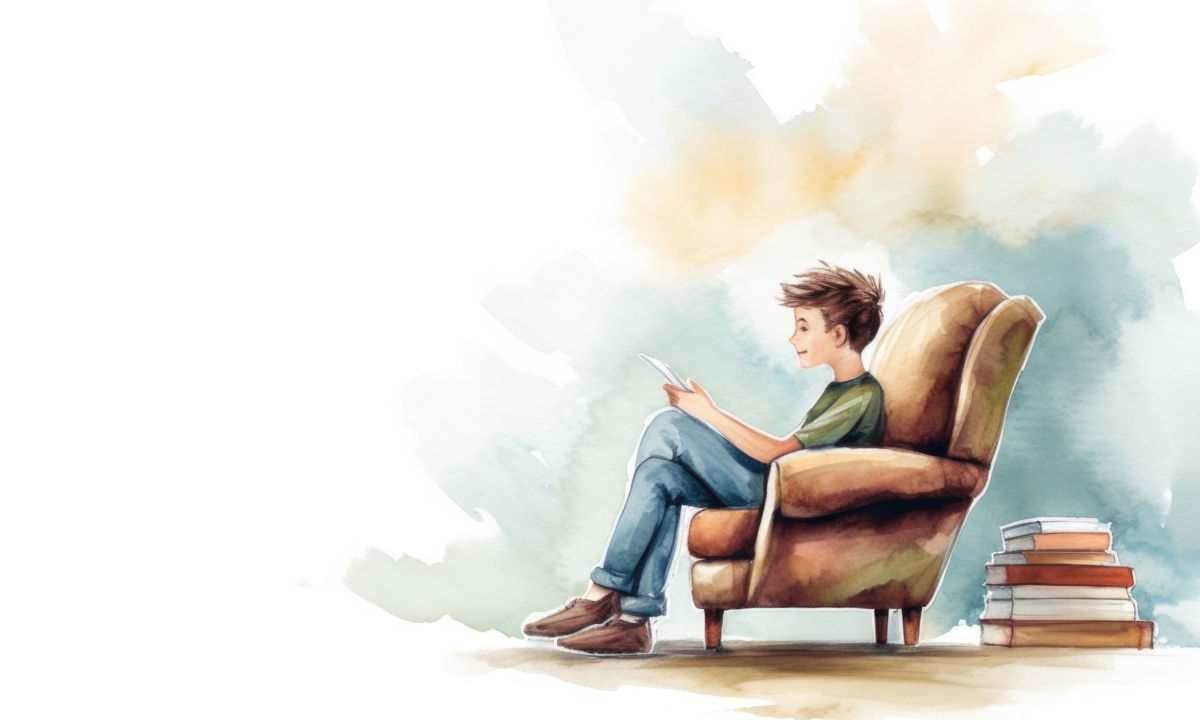ARTS / CULTURE & LEISURE
Reading makes me see pros and cons of social media
Editor's Note:
"Read ten thousand books, and your pen will be guided as if by the gods" is an ancient Chinese idiom that can be seen in students' textbooks. China's Ministry of Education has published an action plan to further promote reading among students across the nation. With new and diverse book recommendations, the reading scene is expected to be revived not only at schools, but also across society. To contribute to this endeavor, the Global Times launched "My Reading Life" essay contest for middle school students.
Please pick up a pen and share your stories with us at reading@globaltimes.com.cn
Participants will be rewarded once the article has been selected.

The book I read about is titled The Anxious Generation. Written by social psychologist Jonathan Haidt, it explores the surge in challenges facing young people, particularly since the early 2010s. It attributes this crisis to a major social shift in the rise of phone-based, social media-driven childhoods.
I first came across this book because my mom was reading it. We had an intense debate about the book, especially addressing the topic of how social media has changed our lives. In my opinion, 100 years ago "social media" was romantic novels such as The Dream of the Red Chamber. I simply refuse to live a dormitory life without my mobile device, as a smartphone is not just a teenager's bread and butter but his very soul.
Taking social media away is virtually amputating one's soul and digital detox is just a nice name for an execution.
I once heard one of my teachers say that even Steve Jobs didn't allow his children to use iPhone or iPad, and some of the best schools are virtually digital-free.
I think that's unrealistic. Once the wheel was invented, there was no way to live in the perfect Platonic world of the pre-industrial revolution era.
In China without a smartphone, teenagers learning through online content becomes very difficult. When it comes to how to write a movie review or how to design a smart game device, if you try to find the information in a public library, the books available are at least a decade old. So social media is like air. It's everywhere.
Although social media is much needed, after reading The Anxious Generation, I started to reflect on its drawbacks. One undeniable issue is social media content lacks depth. It can be described as "digital fast food." While short videos may bring momentary joy, in the long run, the content on social media is highly time-consuming and can lead to laziness, discouraging people from acquiring knowledge that comes from books, thus reducing one's ability to learn.
Also, studies have linked excessive social media use to anxiety, depression, and feelings of inadequacy, especially in young users. Comparisons to curated lives on social media platforms often lead to negative self-perceptions. Consuming short, fast-paced content trains the brain for instant gratification, making it harder to focus on longer, more complex tasks.
Over-reliance on digital interaction may weaken face-to-face communication skills and reduce the quality of real-world relationships. While social media has its benefits, a balanced approach is essential to minimize these drawbacks and foster healthy use.
However, social media can also be an effective tool for learning when used strategically. Social media platforms often host live sessions or webinars where experts share knowledge. One can also choose to join online communities that share resources, engage in discussions, and answer questions, fostering collaborative learning. During the learning process, we should always cross-check facts from credible sources to avoid misinformation, following multiple creators or institutions to get a balanced view on topics and also allocate specific times for learning to avoid distraction by unrelated content.
How to balance the pros and cons of using social media requires smart methods. On the one hand, the strengths of social media such as its efficiency and power for better communication should be maintained. On the other hand, social media content should be improved to have more depth. Dealing with this question is like building a dam that lets the river flow freely without massive flooding while ensuring farmland is well irrigated at the same time.
The author is a student at Keystone Academy
"Read ten thousand books, and your pen will be guided as if by the gods" is an ancient Chinese idiom that can be seen in students' textbooks. China's Ministry of Education has published an action plan to further promote reading among students across the nation. With new and diverse book recommendations, the reading scene is expected to be revived not only at schools, but also across society. To contribute to this endeavor, the Global Times launched "My Reading Life" essay contest for middle school students.
Please pick up a pen and share your stories with us at reading@globaltimes.com.cn
Participants will be rewarded once the article has been selected.

Photo: IC
The book I read about is titled The Anxious Generation. Written by social psychologist Jonathan Haidt, it explores the surge in challenges facing young people, particularly since the early 2010s. It attributes this crisis to a major social shift in the rise of phone-based, social media-driven childhoods.
I first came across this book because my mom was reading it. We had an intense debate about the book, especially addressing the topic of how social media has changed our lives. In my opinion, 100 years ago "social media" was romantic novels such as The Dream of the Red Chamber. I simply refuse to live a dormitory life without my mobile device, as a smartphone is not just a teenager's bread and butter but his very soul.
Taking social media away is virtually amputating one's soul and digital detox is just a nice name for an execution.
I once heard one of my teachers say that even Steve Jobs didn't allow his children to use iPhone or iPad, and some of the best schools are virtually digital-free.
I think that's unrealistic. Once the wheel was invented, there was no way to live in the perfect Platonic world of the pre-industrial revolution era.
In China without a smartphone, teenagers learning through online content becomes very difficult. When it comes to how to write a movie review or how to design a smart game device, if you try to find the information in a public library, the books available are at least a decade old. So social media is like air. It's everywhere.
Although social media is much needed, after reading The Anxious Generation, I started to reflect on its drawbacks. One undeniable issue is social media content lacks depth. It can be described as "digital fast food." While short videos may bring momentary joy, in the long run, the content on social media is highly time-consuming and can lead to laziness, discouraging people from acquiring knowledge that comes from books, thus reducing one's ability to learn.
Also, studies have linked excessive social media use to anxiety, depression, and feelings of inadequacy, especially in young users. Comparisons to curated lives on social media platforms often lead to negative self-perceptions. Consuming short, fast-paced content trains the brain for instant gratification, making it harder to focus on longer, more complex tasks.
Over-reliance on digital interaction may weaken face-to-face communication skills and reduce the quality of real-world relationships. While social media has its benefits, a balanced approach is essential to minimize these drawbacks and foster healthy use.
However, social media can also be an effective tool for learning when used strategically. Social media platforms often host live sessions or webinars where experts share knowledge. One can also choose to join online communities that share resources, engage in discussions, and answer questions, fostering collaborative learning. During the learning process, we should always cross-check facts from credible sources to avoid misinformation, following multiple creators or institutions to get a balanced view on topics and also allocate specific times for learning to avoid distraction by unrelated content.
How to balance the pros and cons of using social media requires smart methods. On the one hand, the strengths of social media such as its efficiency and power for better communication should be maintained. On the other hand, social media content should be improved to have more depth. Dealing with this question is like building a dam that lets the river flow freely without massive flooding while ensuring farmland is well irrigated at the same time.
The author is a student at Keystone Academy



